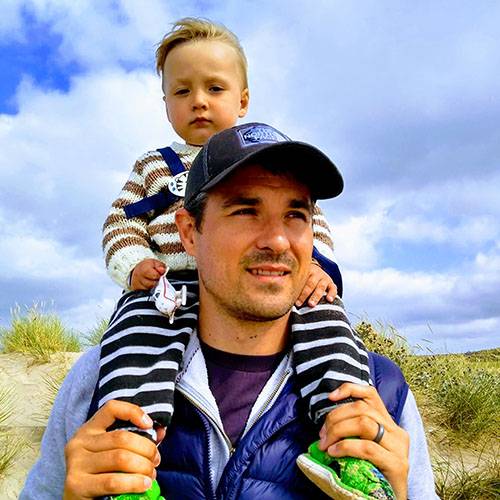In a Q&A, NHS physio Chris Tuckett tells editor Ian A McMillan about the importance of communication
In an exclusive interview with PhysioUpdate, Chris Tuckett explains how he has always followed his interests when seeking out new roles in the NHS. Holding a post as an associate director representing about 1,000 AHPs at a busy NHS trust – while also being a dedicated father with young children and a firm advocate for improving public health – Chris shares some fascinating insights on developing a career path in the NHS.

Tell us about your current job and what your role entails
I am associate director of allied health professions (AHPs) for a large community and mental health trust, North East London NHS Trust. In my role, I represent AHPs across the trust at leadership meetings, working with NHS partners to maximise AHP impact across the system and facilitating several workstreams in which AHPs can have influence.
I also provide guidance and assistance to colleagues in professional matters and regularly look for opportunities to promote the work of our AHPs, both internally and externally. It is a varied role as I seek to equitably represent the nine allied health professions who work at our trust – which amounts to about 1,000 AHP colleagues.
It sounds like a demanding role. Could you give three tips to recent graduates on developing a career in the NHS?
I guess it is a demanding role. Our trust covers more than 3,000 square miles across eastern England and north east London. As a result, it can be difficult to stay abreast of service changes, staff turnover and local issues affecting specific services.
We try to overcome this by having open lines of communication with all our AHP service managers and professional leads. We hold regular meetings, use instant messaging, newsletters, phone calls and, of course, email. However, trying to be proactive and reaching out to colleagues is critical.
I have learned that communication becomes more important as the number of people who you need to keep in touch with grows. Being willing to embrace multiple communication channels while developing your communication skills helps massively.
My top tips are:
- utilise social media effectively. I use it for professional networking, and to share knowledge and research. I have obtained several jobs after spotting adverts on social media, through which I could also gauge the interests and preferences of potential new colleagues and was able to tailor my answers appropriately at interview.
- I find that embracing new software and technology can really help to elevate your communications. Examples such as Prezi, Canva and Menti can help you to stand out, and help you deliver your message more effectively.
- finally, never turn down an opportunity without considering it first. One of the most beneficial experiences I had was delivering a TEDx talk a couple of years ago on a healthcare-related topic. I had to apply and audition for a speaking slot, but in doing so received some one-to-one tuition in speaking publicly on a stage. This has been very useful since.
What challenges did Covid throw at you and your colleagues – and how did you respond?
Covid-19 has demanded a lot of attention as I supported the incident management structure as clinical lead, which is an unusual role for an AHP. It has been a great opportunity to demonstrate how AHPs can fulfil roles more traditionally associated with our medical colleagues. Covid has also allowed AHPs to demonstrate the sheer breadth of their roles, and how they can provide solutions to many Covid-related problems.
We have also used Covid as an opportunity to promote our AHPs, where appropriate.
What occupies and inspires you outside your work?
Outside work I have two children (aged five years and seven months) who keep me very busy!
I have a keen interest in public health and specifically physical activity promotion, and this has resulted in previous roles working for Public Health England. For now, I channel this interest into my local parkrun and my children who I hope will also come to love physical activity. My inspiration comes from the many publications and podcasts I try to read and listen to. I subscribe to New Scientist, The Independent, New Humanist, Science Focus, Wired and T3 magazine.
But with two young kids, I have to admit that my ‘still unread’ pile often outweighs the ‘read’ pile!
Fitness is important to you: is it vital that you as a physiotherapist 'walk the walk'?
I believe that physiotherapists should recognise and promote the importance of regular physical activity in all their work and contact with patients or clients. It is central to wellbeing and physical inactivity and is a recognised health inequality that we should all be seeking to challenge.
As health practitioners we have a responsibility to help people overcome these inequalities and we should recognise the influence and power we hold to advocate for local initiatives that can breakdown social barriers and determinants of physical inactivity. If you reach out and contact local councils, MPs, and organisations to raise the issue of physical activity promotion you may be surprised at how your involvement will be welcomed.
What's the next step in your career path?
I tend not to plan my career, but instead follow my interests. If I can advocate for AHPs while continuing to promote physical activity, I will be happy to explore any opportunities that present themselves. For now, I am focused on supporting my AHP colleagues to deliver their services to a high standard while ensuring they get the appropriate level of recognition for doing so.
Chris Tuckett is associate director of allied health professions with North East London NHS Foundation Trust.
Author: Edited by Ian A McMillanShare it with














